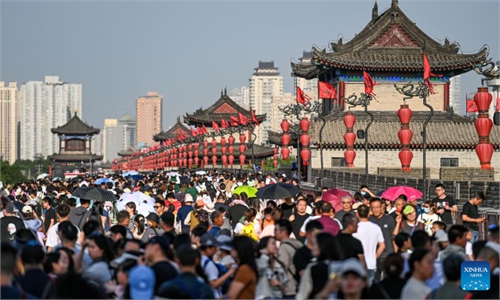ARTS / CULTURE & LEISURE
Chinese nature reflects balanced maxim

Illustration: Chen Xia/GT
China's work sector faces criticism by some foreign media, but its detractors fail to see the flip side of the coin - a culture that encourages a "work hard, play hard" balanced approach to life, in line with a philosophy of diligence in all matters. Indeed, some aspects of corporate life in China may appear daunting from the outside. Far from being the preserve of the competitive financial and business markets in Beijing, Shanghai, Guangzhou, and Hong Kong, this same attitude toward hard work is seen across the board, with everyone from deliverymen, to teachers and regular office workers. They all go above and beyond in discharging their duties.
The 9-9-6 work culture, meaning working from 9 am to 9 pm six days a week, has faced criticism of global and China's domestic media in the recent past. It has also been blamed for the start of several social phenomema in China including the tangping or the lying flat phenomenon, and most recently, sang, for those who bemoan the vicissitudes of a fast-paced life. Though some who identify with both the "lying flat" and "mourning" quasi-cultural phenomena may have valid objections to some aspects of the work culture and work-life balance in China, blaming Chinese culture for society's woes ignores a positive culture often overshadowed by "overwork" concerns.
Having lived in China for seven years now, I will admit that hard work in China is not only required, it is expected of everyone - local or foreign.
My first experience with this was at university. As a Chinese language student, I had to come to terms with the sheer class workload and homework students were expected to get through daily. I was even more horrified when I learned that Chinese students received double the workload we international students were griping about. It was a humbling realization that made me look at my Chinese schoolmates differently.
Not because they were able to make it through mountains of schoolwork, but because they seemed to be living fuller lives than the rest of us.
Despite what seemed, to me, to be a crushing workload, my Chinese counterparts all took sports, were members of a club, met regularly for dinners with friends, and even went out for a night of fun every so often.
This has become a recurring theme with Chinese friends, acquaintances, and workmates, who, despite the stresses of modern life, seem determined to live to the fullest. Unlike your typical waiguo ren or foreigner in China, they all have multiple hobbies they engage with regularly. They are also avid domestic and international tourists, and all while maintaining a robust relationship with a strong network of friends, all of whom have varying interests and entirely different careers.
The enterprising and hardworking nature of Chinese people is a source of all happiness. Indeed, it is the source of pride in China, and is infused into everything people do in the country. No half-measures are ever considered.
Global media has also earnestly reported on the pandemic of loneliness. More and more young people are feeling isolated and have few to no friends, and no intimate partnerships. Chinese people born after the 1980s face a unique challenge in that regard. Many are only children who might not have cousins, and come from smaller families than their Western counterparts. This, however, is not the expected recipe for isolation it may appear to be.
As with most things in China, a practical and moderate approach is taken to tackle the growing culture of loneliness and isolation. What to an outsider might look like an expensive hobby, or inordinate hours spent fixated on improving or perfecting a skill, are the building blocks of strong, long-lasting friendships, that sometimes lead to tales of romance. Chinese parents put their young children on this path early on, with the hopes that extra-curricular skills will be beneficial beyond standing out in a college application.
The meteoric rise in popularity of night classes and apps that collate them also proves that there is a desire for proactive connection. A Zen approach is not the way to go; it is understood that you work for what you want to get, including friendship, and even enjoyable leisure time. Elements of honor in hard work might escape the uninitiated, from the enthusiastic ayi or middle-aged ladies practicing seemingly simple yet intricate choreographed dancers, to the dogged insistence of locals to power through an English conversation with foreigners despite a lack of fluency.
Also, long before self-care was a mainstream term globally, Chinese people were taking proactive steps to safeguard their health, from regularly drinking fruit- and flower-infused teas with proven health benefits, to an after-dinner sanbu or stroll to aid in digestion. Urban Chinese spaces and communities are also littered with public exercise equipment which rarely sits unused, with exercise enthusiasts of all ages taking varying forms of light exercise throughout the day. Traditional Chinese Medicine techniques like guasha lymphatic drainage bones have also made their way into the contemporary beauty industry lexicon, with Western beauty influencers swearing by the beauty implement, and in therapeutic massage for youth and vitality - all self-care hacks from a proactive Chinese health culture.
Chinese culture truly embodies the maxim "work hard, play hard," with young and old refusing to take a back seat to life caprices, and instead tackling everything head-on, with an enthusiasm born out of a national cultivation of passionate dedication to whatever one commits oneself to.
There is a core belief in being the change that you want to see, and if you want it, be it money, love, or even a fun day out, you have to be proactive about getting it.
The author is an editor of the Global Times. life@globaltimes.com.cn

